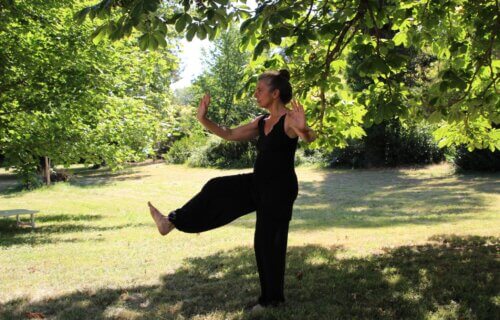SOPHIA ANTIPOLIS, France — Tai chi, the ancient Chinese martial art, is a common practice among people all over the world looking for a less strenuous way to exercise. Now, a new study finds this technique could also help the mental health of people suffering from a stroke.
Researchers from the University of Arizona find tai chi has the potential to reduce symptoms of sleep problems, anxiety, and depression among these patients. Studies show one in three stroke survivors develop depression and report sleep issues or anxiety after their ordeal. Along with being beneficial to the body, scientists have also shown that practicing tai chi can have a tremendous impact on mental health issues, such as ADHD and depression.
“Mind-body interventions are commonly used among adults to lessen depressive symptoms,” says study author Dr. Ruth Taylor-Piliae in a media release.
“Tai chi practice allows the individual to quiet the mind by dwelling in the present and setting aside unnecessary negative emotions, such as depression.”
Strokes occur when there is an interruption in the flow of blood to the brain, usually due to a blood clot. They’re the third-leading cause of death in the United States, but have a link to the top cause — cardiovascular disease.
‘Significant’ turnaround in mental health
Dr. Piliae and her team studied 11 stroke survivors who attended tai chi intervention classes for eight weeks. The team measured symptoms of anxiety, stress, and depression with questionnaires gauging their well-being before and after the experiment.
Researchers also measured sleep quality nightly using a movement sensor. Lastly, participants had their oxidative stress and inflammation measured via blood samples before and after practicing tai chi.
Results show that although the level of oxidative stress dropped, inflammation stayed the same. At the end of the study, participants reported “significant” reductions in depression, anxiety, and sleep problems.
“At baseline the participants reported mild to moderate symptoms of depression, anxiety and stress,” Dr. Piliae reports. “I was surprised and pleased with the improvements we observed in these self-reported symptoms and in sleep with just an eight-week intervention.”
“Our ultimate goal is to see whether tai chi lowers depressive symptoms in stroke survivors and also improves biochemical markers associated with depression,” the study author continues. “The results of this feasibility study should be interpreted with caution because of the small sample size and lack of a control group.”
“More research is needed before recommendations can be made about tai chi for people who have had a stroke,” Dr. Piliae concludes. “We hope to do a randomized trial with a 12-week tai chi intervention in a larger group of patients.”
The research team presented their findings at the European Society of Cardiology’s online scientific congress.
SWNS writer Olivia Devereux-Evans contributed to this report.
